One is from the southern U.S. border.
The other from the northern border.
One trained to become a manager at a 7-Eleven and even contemplated following his father into the military.
The other wanted to be a talk radio personality so he could tell students when school was canceled because of bad weather, but when his initial foray into the business didn’t pay enough, he became a machinist at a steel mill.
Both would eventually wind up in talk radio full time, despite one’s name being at the bottom of the list of potential candidates for his first radio job. The other was chosen because the owner at the station he joined as a disc jockey (after leaving the steel mill) couldn’t find anyone she wanted to hire for a talk show and finally looked his way despite the fact that he much preferred music to talk.
Meet Gary McNamara and Eric Harley, whose paths eventually crossed at WBAP radio in the Dallas-Fort Worth metroplex in the early 2000s and who today are co-hosts of Red Eye Radio (RER), the five-hour overnight talk show that, after humble beginnings in 1969, is now heard on more than 240 radio stations nationwide, including radio giants such as WABC in New York City, WLS in Chicago, WBAP in Dallas-Fort Worth, and KABC in Los Angeles. The show and its podcasts can also be downloaded and streamed online.
How it all started
McNamara grew up in Buffalo, New York, and recently recalled his exact introduction to talk radio.
In addition to his music program, McNamara was manager of the station he’d joined after leaving the steel mill.
“The owner came up to me and said, ‘You’re going to do the talk show,’” shared McNamara. “And I said, ‘No, I won’t and I can’t.’ She said, ‘Well then, you have no choice.’ And so here I am 31 years later. I’m probably one of the few people forced into doing talk radio, having no idea that it was exactly what I would absolutely have the most passion for. In talk radio, you get to do everything. You get to be producer, director; you get to have a great editorial control and creativity that does not exist anywhere else.”
McNamara, who is single and 65 years old, held jobs in Buffalo, Portland, Chicago, and Rockford, Illinois, before winding up at WBAP in 2000.
Harley, who is married with four adult children and eight grandchildren, grew up in Texas, graduating from high school at Wichita Falls, Texas, in 1984, after spending his formative years in Del Rio, Texas, on the U.S.-Mexican border.
He had not necessarily considered a career in radio but did apply at a local radio station just “because they were hiring.” Because he had no car, a friend, David Anderson, took him there and both men interviewed for a job.
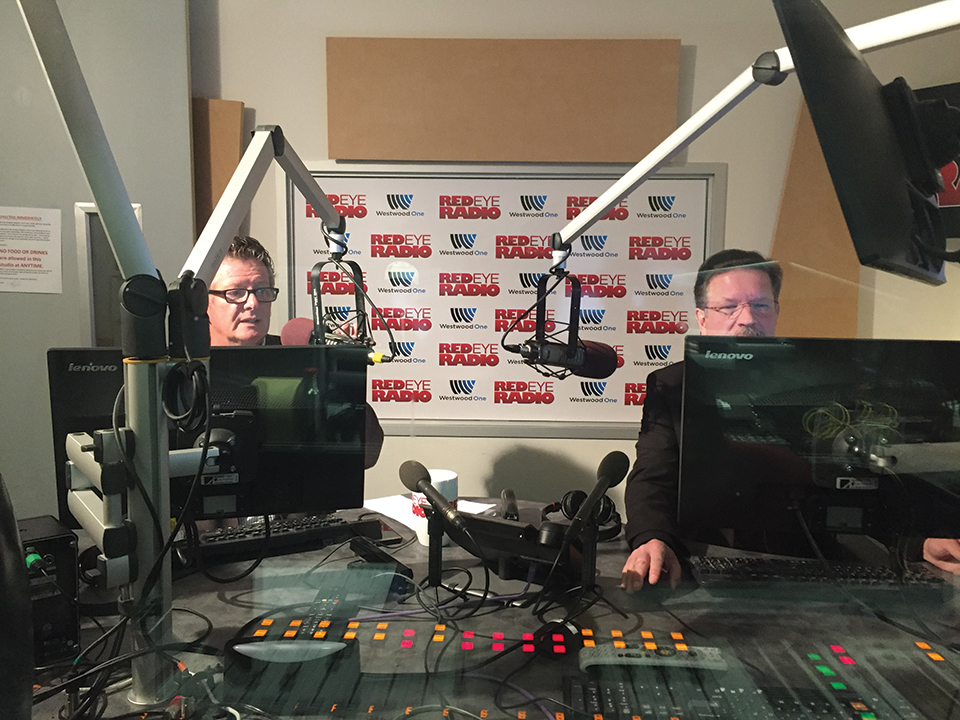
As the interview began, Harley was told the station wouldn’t hire anyone who did not have radio experience.
He was set to go to work for 7-Eleven at a store within walking distance from his home. On his first day at work he was told to report to a different location that would require a commute, so he had to decline the job because he had no transportation.
That same day, Harley was at home, fully dressed, when the phone rang. It was the manager of the station where he’d interviewed. The manager asked if Harley could come to the station, so his mother gave him a ride.
“I went inside the studio and the manager asked, ‘Are you Eric?’ And I said yes,” Harley recalled. “He said, ‘OK, great. I have a 40-hour-a-week job for you.’”
The manager had a yellow legal pad he showed to Harley, whose name was at the very bottom of the list of candidates. All the other names, including Harley’s friend, Anderson, were crossed out. The manager had tried to contact the other candidates, but Harley was the only one he was able to reach.
“David told me later he’d heard the phone ring when the manager tried to call him, but he ignored the call,” said Harley.
Harley eventually moved to Dallas, and in 1996 joined the late Bill Mack who had started the show as “The Midnight Cowboy” in 1969.
Mack’s show centered around music, but by the early 2000s, the show started trending toward more talk than music.
After Mack’s departure in 2001, the name of the show was changed to Midnight Trucking Radio Network (MTRN) and Harley and Joe Kelley were tapped as hosts.
In 2005, Kelley left for a radio job in Tulsa, Oklahoma.
On-air chemistry
The Midnight Trucking Radio Network became Red Eye Radio Network in November 2011 when Citadel Media was purchased by Cumulus Media. MTRN was placed inside Westwood One Radio Networks as a syndicated program. The show is on the air from midnight to 5 a.m. central time.
While “trucking” was removed from the title, it remained a trucking show, targeting over-the-road drivers.
One of the first conversations Harley recalled having with his new on-air partner came when he received a call while waiting to board a plane to the Walcott Truckers Jamboree.
“He said, ‘Look, we’re going to make the best of this and have fun,” recalled Harley. “He was so enthusiastic and had a positive tone.”
It didn’t take long for Harley and McNamara to figure out that the two had real on-air chemistry.
“I’ve had off-air chemistry with radio friends,” Harley said. “It seemed as though we were going to have the greatest morning show ever, but it just didn’t work.”
It was different with Harley and McNamara.
“On-air chemistry is extremely rare when it is put together by outside forces,” said Harley. “I can’t speak for other shows. But like Gary said, we may have different approaches, but we do have the same ideology. Gary may be from the northern border and I from the southern border, but we’ve built this chemistry that I’ve never experienced in a professional setting.”
As much as they like and respect one another, McNamara and Harley do not socialize outside of work.
“It’s not because we don’t like each other,” quipped Harley. “We’d probably sit around and commandeer a whole room. But we’ve never done that. If you don’t socialize and discuss issues, you’re able to bring your initial authentic thought to the show. Sometimes you sacrifice everything for the show, including sleep. Sometimes you sacrifice family time — everything for the show. And sometimes you sacrifice friendships or conversations so that you can save it to bring it to the audience, to serve the show your audience completely. That’s been our theory and motto from the beginning.”
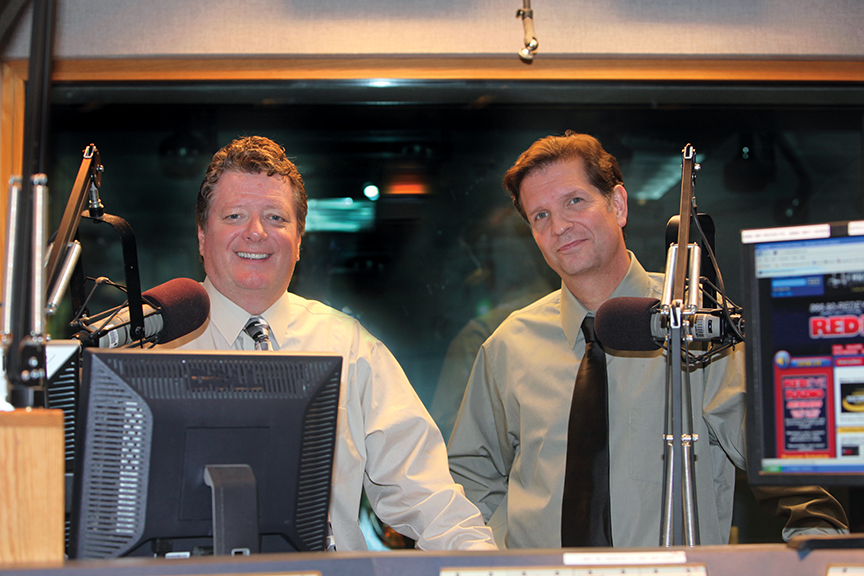
‘Unselfish’ approach
There is no ego on the show, either, McNamara said.
“You have to be unselfish,” he added. “I don’t care [which of us] gets the punch line. I don’t care who makes the better point, because Eric may make the better point. The whole idea is to build the continuity of two people becoming one, a kind of entertainment vehicle. When I started with Eric, the one thing I was thinking is I’d always be solo on talk radio. I’d never worked with anybody else. And the fear is that you will lose part of yourself if you don’t dominate, because it’s not your personality. It’s just the opposite with Eric. He brings out so much of me. And I know I bring a lot out of Eric.”
“You sacrifice ego in order to build a better program for the listener,” added Harley. “Gary’s dad was an engineer and had a very thoughtful mind. My father was in military and law enforcement and served in two wars. But we, like them, are both critical thinkers.”
McNamara’s father John had a mantra of DTJ, short for “do the job.” For Harley’s dad, the mantra was “show up.”
“You show up to do the work and you show up every day,” said Harley, “and you do the job. The idea is you are serving a greater purpose.”
When McNamara gets on a roll, Harley says he just sits back and listens.
“I feel like I’m at school, because there are things I don’t know. It’s important to let that happen for the show,” he said.
He also stresses he’s not a microphone hog — someone who dominates the conversation.
“If you set your ego aside and realize that you’re serving that greater purpose, your moment will happen,” he said. “If you’re showing up every day, if you’re doing what John McNamara (Gary’s dad) says, and what Jimmy Harley (my dad) said, your moment will happen. You have to begin and end with that purpose. If I have a driver coming up to me and he calls me, Dave Harley (instead of Eric), I’m OK with that.”
Also okay with Harley and McNamara are the appreciative comments they hear from drivers.
“We received one recently that said, ‘You guys keep me awake all night because you guys talk about this and talk about this and, you know, and I’m just, it just keeps me awake,’” shared Harley. “If at the end of the show we get an email or call from a driver saying, ‘You keep me awake all night and educate and involve me,’ it’s mission accomplished.”
Serving the greater purpose of being an entertainment vehicle for an audience that is primarily in the trucking industry is the most important thing for the duo, said McNamara.
The duo has more fun on the air that anyone would believe.
“We walk out of there at five in the morning and we are just thrilled. It’s like the audience says, we are really serious guys,” he said. “We may be serious and have a discipline and an intensity of focus, but it’s all because we get to play the Super Bowl of radio every single night, because that’s what the show really is.”
Listening to listeners
Today, the show is designed around what hosts and producers started to hear from drivers in the early 2000s when the midnight to 6 a.m. portion of the show was primarily music with some conversations about trucking issues.
For the 32 years Bill Mack was with the show, he played country music, and that continued when he left in 2001.
“When I came on in 1996, we were already getting a lot of feedback from drivers at truck shows and phone calls that things were changing,” said Harley. “There were the President Bill Clinton impeachment proceedings and the 2000 election with the disputed count in Florida. Drivers would approach us and say they felt nobody was talking to them at night. Drivers more and more were demanding that we have some conversations about the issues outside of trucking, which there were many. It was about things they were hearing about during the day.”
The show’s popularity and format serve as a good public relations tool for trucking, Harley added.
“We are educating the non-trucking public as to how important trucking is,” said Harley. “We can preach to the choir all day, and we can all stand around at the Mid-America Trucking Show and appreciate what the industry does, but it is a much bigger job to go out and educate the American public as to the role of those trucks. The public doesn’t understand the role of trucking and what would happen in the event of a catastrophic trucking shutdown.”
The show’s content is now focused on world, national, and trucking-specific issues.
While the staying power of the show revolves around the chemistry between Harley and McNamara, there is also personal discipline, especially when it comes to rest.
After all, working five nights a week between midnight and 5 a.m. is outside the routine of most Americans.
McNamara said he’s home by 5:30 a.m. (central time) and in bed by 6 a.m. He sleeps until 10 a.m. gets up, takes care of personal business and sleeps again from 6 p.m. to 10 p.m., when he gets up to prepare for the show.
“I’ve been very blessed. If I couldn’t do that, I couldn’t do the show. You have to be disciplined; you have to eat right. You’ve got to exercise. You have to be in really good shape,” he said.
Harley gets about half the sleep that McNamara gets, only sleeping from 6 a.m. to 10 a.m.
“You know, I’m married with grandchildren,” he chuckled.
Lyndon Finney’s publishing career spans over 55 years beginning with a reporter position with the Southwest Times Record in Fort Smith, Arkansas, in 1965. Since then he’s been a newspaper editor at the Southwest Times Record, served five years as assistant managing editor of the Arkansas Democrat-Gazette in Little Rock and from November 2004 through December 2019 served as editor of The Trucker. Between newspaper jobs he spent 14 years as director of communications at Baptist Health, Arkansas’ largest healthcare system. In addition to his publishing career he served for 46 years as organist at Little Rock’s largest Baptist church.








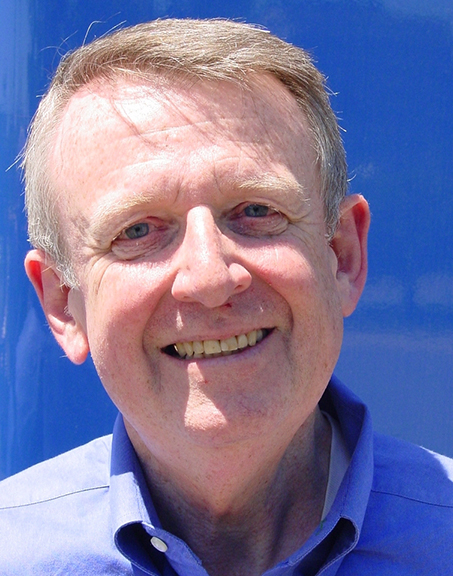

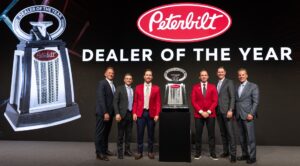

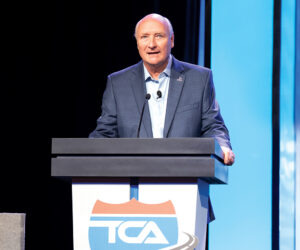
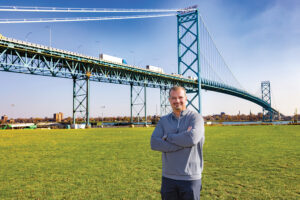

Thank you for posting this great article on the hosts of this wonderful and interesting program. I am suprised that the guys do not socialize outside the show. I think that they would have a good time together eating out or going out for coffee. It gives me a good insite of the kind of life they lead outside of the show. Love this article and of course Gary and Eric for being the kind of people they are today.
I think these 2 guys are the boringest driest host ever on midnight to 5..I miss all the truckers calling in to Steve Summers an Dave Martin..I personally want Steve an Dave back…why would you pay 2 people when you only need 1 host at midnight
Just wanted to tell you both, You Rock. I live in vegas and have to hear you’re show every evening. Thank you guys for a truly amazing show.
Absolutely love listening to Eric an Gary’s show. Even listen to podcasts. They should be on tv. Reminds me of the Johnny Carson show. Which is baby boomers still miss. Their chemistry is so unique. Love to have the banana bread Gary makes Please keep this show on the radio. I listen to kdka at nights. Absolutely love your show together. You make me laugh. Thank you. So glad I found your show!
I found you on my local radio in Idaho, OH YES A RED STATE. that I am not happy with, too many Republicans. This is why I stopped listening to you. You are both Propagandists and I cannot believe the things you are doing to our Democracy. I read your profiles and now I understand why you have no education. You have no love of country, your radio is not a program for educated people. Now I understand why Gary talks the most and thinks he knows
it all. Glad I found this so I can let you know what losers you really are. Canceled listening because I hear enough hot air from TV.
Where are Gary & Eric? Their old time slot it occupied by Frank Mariono on the other side of midnight…As seeing this article, I’m wondering if Gary & Eric are still broadcasting. If they are, where are they? I gave up searching for them. Please let me know !!!!
Hey….there wasn’t any mention of Gary working at KMHT radio in Marshall, Texas back in the late 80’s. I know that….because I worked with him for a few years!
i’ve been listening to late nite talk radio for many years. jay Diamond.Larry King,Michael Savage,Barry Farber,Coast to Coast,and Gary,and Eric. Keep up the great work. Ever thought writing a book?
Great program gang !!!!! Keep up the great work…
As a “leftist” liberal. I listen to Red Eye Radio so that I can gain insight into what some of my fellow Americans at the other end of the political spectrum are thinking about–and because I have severe insomnia. I like Gary the best when he tells stories about the various paths he took coming up–and dislike him the most when he claims someone is “LYING” when he disagrees with that person, as if calling simply calling someone a “LIAR” is a convincing logical argument. I am surprised that Eric, with so many years of on-air experience, spends so much time saying, “Um” and “Uh” and “I mean.” Truth be told, I miss Michael Savage, who at least was well-read.
lost them from 105.1 when, Quincy, IL and haven’t been able to find them anywhere else. miss you two a lot
These two have a rare and excellent show. When I worked in my Carrollton shop at night ,Red Eye Radio kept me entertained and able to finish my projects. Now I am retired in Florida and haven’t tuned-in in years. I missed their camaraderie. Their political analysis is spot on. I have often thought of Gary’s parents. He was always visiting them and taking care of his niece. Then I think of the Guillotine man Christmas present. I still chuckle at that.
You guys are terrific, providing intelligent and humourous listening. My Wife, Betty and I (Tom)
are late nighters, parents of 7 and Grandparents of 17.
Your commentary keeps us up late, ejoying every minute. It’s nice to hear intelligent, and nail-on-the head, sensible and humorous talk on the radio.
All the best and keep on keeping on. Betty and Tom, Cincinnati.
I love this show! I live way over in Oregon, and this is about the only late night radio I can pick up where I live. (Except for sports—UGH!!!) You guys are the best, and I completely agree with you on almost everything. Hope your show lasts a long, long time. God Bless You Both!
Does anybody remember the woman that was on late nights. She used to always say how is your bad self. Just can’t recall her name. Tough to get old.
I think the only way you dominate late night air ways is that you must be dirt cheap! You guys do fill a time slot no one wants, and most radio stations need a cheap alternative to keep them on air all night. I live and work in an area that has limited stations that offer talk radio and you guys are on both of them on my way to work at 4:00 AM, I can only take a week at a time of listening before I go back to classic rock. You rarely take phone calls, you do no show prep, you cover no new news, you only regurgitate what you read!!! Please take the time to listen to one of your shows, the artificial laughs, the number of times you say, “and again” and “as we have always said” Do some show prep at least a few hours before your show, take callers and listen to them without shutting them down! Call Dan Mandis and get some ideas from him.
You have good insight into today’s events. I listen to you on an AM KOH out of Reno and an FM 106.2 KINS near Eureka California.
these globalists must love the canuks booing the u s anthem at hockey,,,take your 20 minute an hour show and put it where the moon dont shine
CAN’T FIND THEM IN DALLAS THEY WERE ON 820AM BUT NOT NOW DOES ANYONE KNOW WERE THEY ARE IN THE CDALLAS AREA